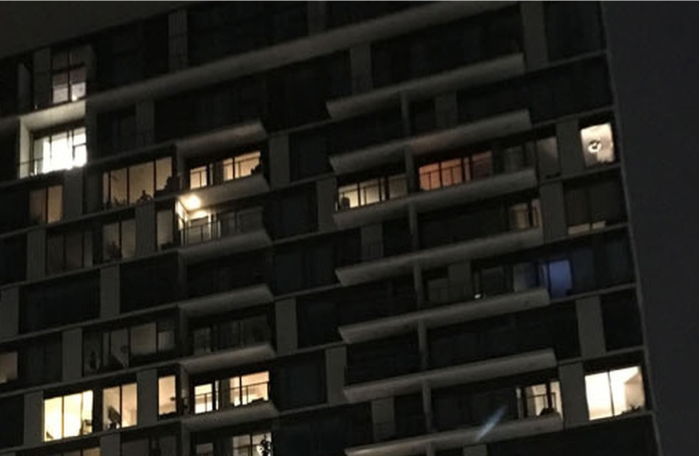CommentsDEEGAN ON LA-The lights that have been out in vacant apartments and condos across Los Angeles may start to burn brightly if voters approve a vacancy, or “empty home,” ballot measure if it appears in the November election.
Why are there vacancies during a housing shortage? It could be that speculators and investors are parking their money in real estate that sits empty, or that landlords are “warehousing” apartments as a strategy to slowly empty their apartment buildings before converting to condos.
How many “vacant” units do we have in LA? A drive around town after dark can give some anecdotal evidence of mostly blacked out residential towers (Wilshire Boulevard in Westwood is a prime example); there are other examples like a luxury residence building near the Beverly Center that sits forlornly with not even accents of light to brighten it except for the street-level retail showcase windows.
An “Empty Homes Penalty” Motion being deliberated by the LA City Council is an attempt to reconcile this dark void of lightless buildings across the city while also generating substantial revenues.
Politicos sensitive to the homeless crisis, and the parallel affordable housing crisis, want to create a “vacancy” or “empty home” tax and apply it to these residences.
Bur first, they need to know the scope of the situation: in addition to clarifying the number of vacancies, there are also questions about what the tax rate would be, what the political process for getting this done is, and whether the city will have to spend money to make money.
These are some of the proposed benefits of the motion for a tax on speculators and property owners who keep habitable housing units vacant:
- Return empty or under-utilized properties to use as long-term rental homes
- Help relieve pressure on the region's rental housing market
- Create a revenue stream for affordable or homeless housing and services.
Once again, the city is looking for money to direct toward the homeless issue, despite the recent $1.2 billion in Prop HHH bond funds that have hardly made an impact for the tens of thousands of homeless who do not hide in the dark but are visible every day to everyone in the city. It will be no surprise if the marketing of the prospective tax will be hooked to the issue of “homeless relief.”
The assumed tax rate on the affected unoccupied residential and commercial units, as well as vacant parcels, would be $5,000 per unit or parcel per year (and proportionately higher for larger parcels).
The political process for getting this done is through a ballot measure in November, with two-thirds of the votes required to be affirmative. The City will have to spend money to make money -- it will cost $12 million to put the measure on the ballot. The offset to that is an estimate from the Chief Legislative Analyst (CLA) that the tax will generate estimated initial revenues of around $128 million annually in gross revenue to the city, with that expected to decline to $100 million over time as properties are utilized (developed, rented, etc.).
The City’s costs to administer the new program is reported by the CLA as $5.6 million annually; and one-time implementation costs are estimated at $2.9 million.
The program, one of several the City’s Revenue Generation Commission is looking at, appears good on paper but is already creating controversy among budget watchdogs who are concerned about the process of arriving at the motion.
In Oakland, according to the motion, with a population one-tenth the size of Los Angeles, where voters approved an empty homes penalty in November 2018, the city is expected to raise an estimated $10 million annually for 20 years to fund homeless services, preserve and create new affordable housing.
The Vancouver model is their Speculation and Vacancy Tax. It’s an annual tax paid by some owners of residential properties that is designed to discourage housing speculation and people from leaving homes vacant in British Columbia’s major urban centers.
If Oakland and Vancouver could do it, could we? Should we? Answers to these questions, now facing the City Council, are needed by July 1.
(Tim Deegan is a civic activist whose DEEGAN ON LA weekly column about city planning, new urbanism, the environment, and the homeless appears in CityWatch. Tim can be reached at [email protected].) Edited for CityWatch by Linda Abrams.















